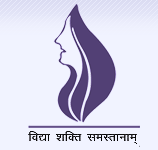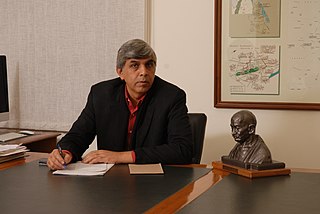Related Research Articles

Rahul Gandhi is an Indian politician and a member of the Indian Parliament, representing the constituency of Wayanad, Kerala in the 17th Lok Sabha. A member of the Indian National Congress, he served as the president of the Indian National Congress from 16 December 2017 to 3 July 2019. Gandhi is the chairperson of the Indian Youth Congress, the National Students Union of India also a trustee of Rajiv Gandhi Foundation and Rajiv Gandhi Charitable Trust.

Manmohan Singh is an Indian economist, academic, and politician who served as the 13th Prime Minister of India from 2004 to 2014. Currently, he is a Member of Parliament in the Rajya Sabha, representing the state of Rajasthan. A member of the Indian National Congress, Singh was the first Sikh Prime minister of India. Singh was also the first prime minister since Jawaharlal Nehru to be re-elected after completing a full five-year term.

Smriti Zubin Irani is an Indian politician and a former television actress and producer. She is the Minister of Women and Child Development in the Union Cabinet of India since May 2019. A prominent leader within the Bharatiya Janata Party, she is a Member of Parliament in the Lok Sabha, representing Amethi.

The Indian Institute of Planning and Management (IIPM) was an unaccredited institute headquartered in New Delhi, which previously had 18 branches across India. The institute has been widely criticized for false advertisements and fraudulent practices. After several controversies, the school's Honorary Dean Arindam Chaudhuri decided to shut down all campuses across India, except the one in Delhi. Founded in 1973, the institute used to offer undergraduate, postgraduate and doctoral programmes in national economic planning and entrepreneurship, and international and fellowship programmes. Its executive education programmes include non-credit courses and visits to foreign business schools. IIPM is not accredited by UGC or All India Council for Technical Education (AICTE), and is not affiliated with the public Indian Institutes of Management.

The University of Delhi, informally known as Delhi University (DU), is a collegiate public central university located in New Delhi, India. It was founded in 1922 by an Act of the Central Legislative Assembly and is recognized as an Institute of Eminence (IoE) by the University Grants Commission (UGC). As a collegiate university, its main functions are divided between the academic departments of the university and constituent colleges. Consisting of three colleges, two faculties, and 750 students at its founding, the University of Delhi has since become India's largest institution of higher learning and among the largest in the world. The university has 16 faculties and 86 departments distributed across its North and South campuses. It has 77 constituent colleges and five other institutes. The Vice President of India serves as the university chancellor.

Jawaharlal Nehru University (JNU) is a public central major research university located in New Delhi, India. It was established in 1969 and named after Jawaharlal Nehru, India's first Prime Minister. The university is known for leading faculties and research emphasis on liberal arts and applied sciences.

Miranda House is a constituent college for women at the University of Delhi in India. Established in 1948, it offers degrees in the sciences and liberal arts.

Aliah University (AU) is a state government controlled autonomous university in New Town, West Bengal, India. Previously known as Mohammedan College of Calcutta, it was elevated to university in 2008. It offers undergraduate and postgraduate programs in different Engineering, Arts, Science, Management and Nursing subjects.

The All India Council for Technical Education (AICTE) is a statutory body, and a national-level council for technical education, under the Department of Higher Education. Established in November 1945 first as an advisory body and later on in 1987 given statutory status by an Act of Parliament, AICTE is responsible for proper planning and coordinated development of the technical education and management education system in India.

Delhi Technological University (DTU), formerly known as the Delhi College of Engineering (DCE) is a state university in New Delhi, India. It was established in 1941 as Delhi Polytechnic. In 1952, it started giving degrees after being affiliated with the University of Delhi. The institute has been under the Government of Delhi since 1963 and was affiliated with the University of Delhi from 1952 to 2009. In 2009, the college was given university status, thus changing its name to Delhi Technological University.

CHRIST , is a deemed to be university in Bangalore, Karnataka, India. Founded in 1969 as an autonomous college, on 22 July 2008 it was declared as an institution deemed to be university under section 3 of UGC Act 1956 by the Ministry of Education (India). The university is under the management of the priests of the Catholic religious order, Carmelites of Mary Immaculate (CMI), part of Syro Malabar Major Archiepiscopal Church. In 2016, the University was accredited by National Assessment and Accreditation Council with A Grade.

The First Ministry of Narendra Modi is the Council of Ministers headed by Narendra Modi that was formed after the 2014 general election which was held in nine phases from 7 April to 12 May in 2014. The results of the election were announced on 16 May 2014 and this led to the formation of the 16th Lok Sabha. The Council assumed office from 27 May 2014.

Bhagini Nivedita College (BNC) is one of the 85 constituent colleges of the University of Delhi. The college is located in Kair, near Najafgarh, New Delhi.

Ram Lal Anand College (RLA) is located in New Delhi, India. It has been one of the University of Delhi's maintained colleges of since 1973. It awards degrees under the purview of the university and offers courses at the undergraduate level. The college is situated in the South Campus of University of Delhi. It is a co-educational college that admits students and selects teachers from all communities irrespective of gender, caste, religion and physical challenges.

Professor Dinesh Singh, chancellor K.R. Mangalam University is an Indian professor of mathematics. He served as the 21st Vice-Chancellor of the University of Delhi, is a distinguished fellow of Hackspace at Imperial College London, and has been an adjunct professor of Mathematics at the University of Houston. For his services to the nation he was conferred with the Padma Shri which is the fourth highest civilian award awarded by the Republic of India.

The Indian Institute of Management Visakhapatnam (IIMV) is a public business school and Institute of National Importance located in Visakhapatnam, Andhra Pradesh, India. It is one of the twenty Indian Institutes of Management. The institution started the first batch of its Post Graduate Program (PGP) in Management from August 2015. Visakhapatnam is the largest city in Indian state of Andhra Pradesh. The city is the administrative headquarters of Visakhapatnam district and the Eastern Naval Command of Indian Navy. Its geographical location is amidst Eastern Ghats mountain range and the coast of Bay of Bengal.

Shyama Prasad Mukherji College commonly known as SPM College, is a constituent college of the University of Delhi. The all-women's college was founded in 1969 and named after Syama Prasad Mukherjee.
Pinjra Tod is a collective of women students and alumni of colleges from across Delhi, India, that seeks to make regulations for hostel and paying guest (PG) accommodation less restrictive for women students. They aim to counter a perceived official narrative that women need to be protected. Challenging what they consider to be the CCTV-driven police-security complex, Pinjra Tod demands that concepts of safety and security not be used to silence women's right to mobility and liberation.
Vidyanjali is a school volunteer programme and an initiative of the Ministry of Human Resource Development of India to boost community and private sector participation in government schools, launched by Smriti Irani. Under the programme, volunteers, including NRIs, retired teachers, government officials, defence personnel, professionals will offer their services for co-scholastic activities for children from class I to VIII. It is the project launched under the aegis of the Sarva Shiksha Abhiyan by the Department of School Education and Literacy.
The National Education Policy of India 2020, which was approved by the Union Cabinet of India on 29 July 2020, outlines the vision of new education system of India. The new policy replaces the previous National Policy on Education, 1986. The policy is a comprehensive framework for elementary education to higher education as well as vocational training in both rural and urban India. The policy aims to transform India's education system by 2040.
References
- ↑ "DUTA Protests against FYUP, Semester System". The Hindu. 19 Feb 2014.
- ↑ "Protests against FYUP continue." The Hindu. 4 October 2013.
- ↑ "Is Delhi University Dying?" Harish Trivedi. Times of India. 29 May 2013.
- ↑ UGC set to make DU scrap FYUP. Times of India. 21 June 2014.
- ↑ UGC gives DU a day to scrap FYUP. Times of India. 23 June 2014.
- ↑ DU rolls back FYUP, says VC Dinesh Singh. Times of India. 27 June 2014.
- ↑ "5 Years After Scrapping Controversial FYUP, UGC Panel Recommends 4-year Undergraduate Courses." Times of India. 4 August 2019.
- ↑ "Modi Government Looks at Bringing Back 4-Year Undergrad Course, Doing Away with Master's for PhD." The Print. 6 August 2019.
- ↑ "New Education Policy can Build from where Four-Year Undergraduate Programme Left." Chettri, Shradha. TOI. 31 July 2020.
- ↑ "Bad Education". Makarand R. Paranjape. Open Magazine. September 2020.
- ↑ "Smriti Irani Defends FYUP scrapping, rejects Saffronisation Charge." | First Post | firstpost.com | Retrieved 27 April 2015.
- ↑ "FYUP Row: It's time to put the institution first." Nandini Sundar. The Hindustan Times. 24 June 2014.
- ↑ Scholars at odds over DU autonomy. Times of India. 25 June 2014.
- ↑ "Academics Raise Voice Against UGC Order on FYUP Rollback". The Indian Express. 23 June 2014.
- ↑ Congress on the FYUP. TOI. 25 June 2014.
- ↑ Modi Govt. to Prioritise a PET UPA Project: Foreign Universities. NDTV. 11 June 2014.
- ↑ "DU-UGC Spat Over, but a Larger Battle Looms: 3 Lessons for the Future". Debaditya Bhattacharya. First Post. 24 June 2014.
- ↑ "Why the Delhi University Undergraduate Reforms Failed." Venkataramakrishnan, Rohan. Scroll. 24 June 2014.
- ↑ "FYUP Programme Structure details for English students". Archived from the original on 21 June 2014. Retrieved 4 July 2014.
- ↑ "9 Things You Should Know About FYUP Row." Times of India. 24 Jun 2014.
- ↑ "DUTA Protests against FYUP, Semester System". The Hindu. 19 Feb 2014.
- ↑ "Protests against FYUP continue." The Hindu. 4 October 2013
- ↑ "A Case for Reforms: Was FYUP Good or Bad for Delhi University?" Hindustan Times. Jun 30, 2014